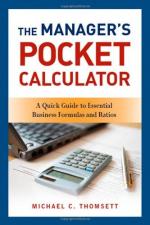|
This section contains 528 words (approx. 2 pages at 300 words per page) |

|
Throughout human history man has invented devices to make repetitive tasks, such as mathematical calculation, easier. For much of history, this was difficult. The advent of methods, which progressed to machines, to help with this dilemma made life much easier for many.
Early Calculators
The first aids in counting were notched sticks and counting cords, simple tools used to retain numerical information over time and distance. These devices did not perform any mathematical operations.
A major revolution came with the abacus. This device allowed both arithmetical operations and the ability to store a fixed sum, which was represented by a given pattern of beads. The abacus, which is still in use today, was fast and extremely useful in the hands of a trained user.
The French mathematician Blaise Pascal is credited with inventing the mechanical calculator in 1642, based on a stylus and wheel design. In 1820, based on Pascal's...
|
This section contains 528 words (approx. 2 pages at 300 words per page) |

|


